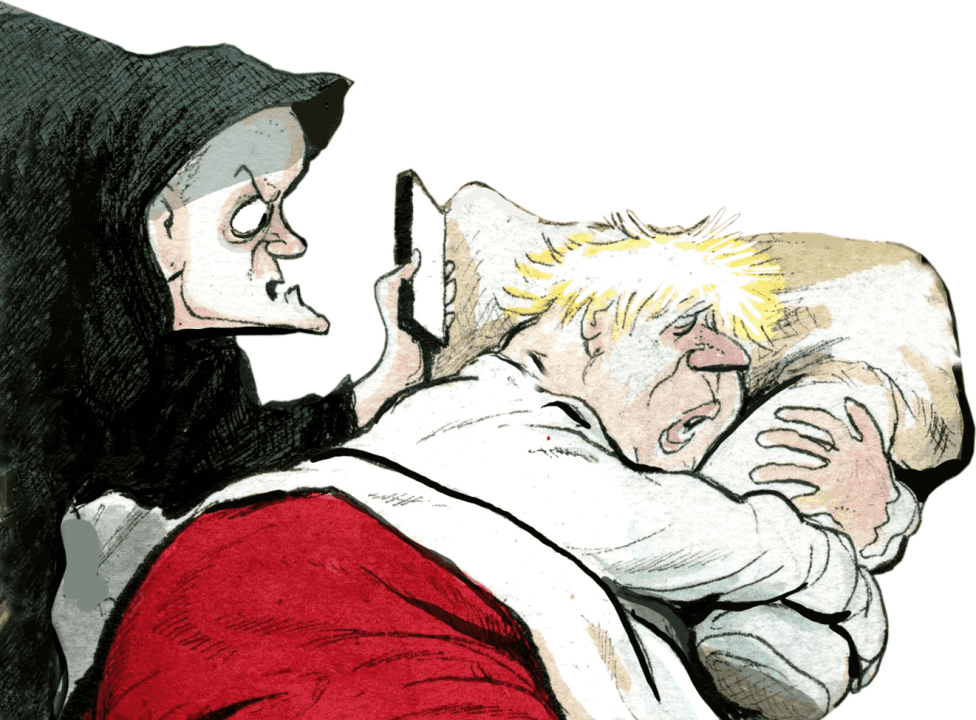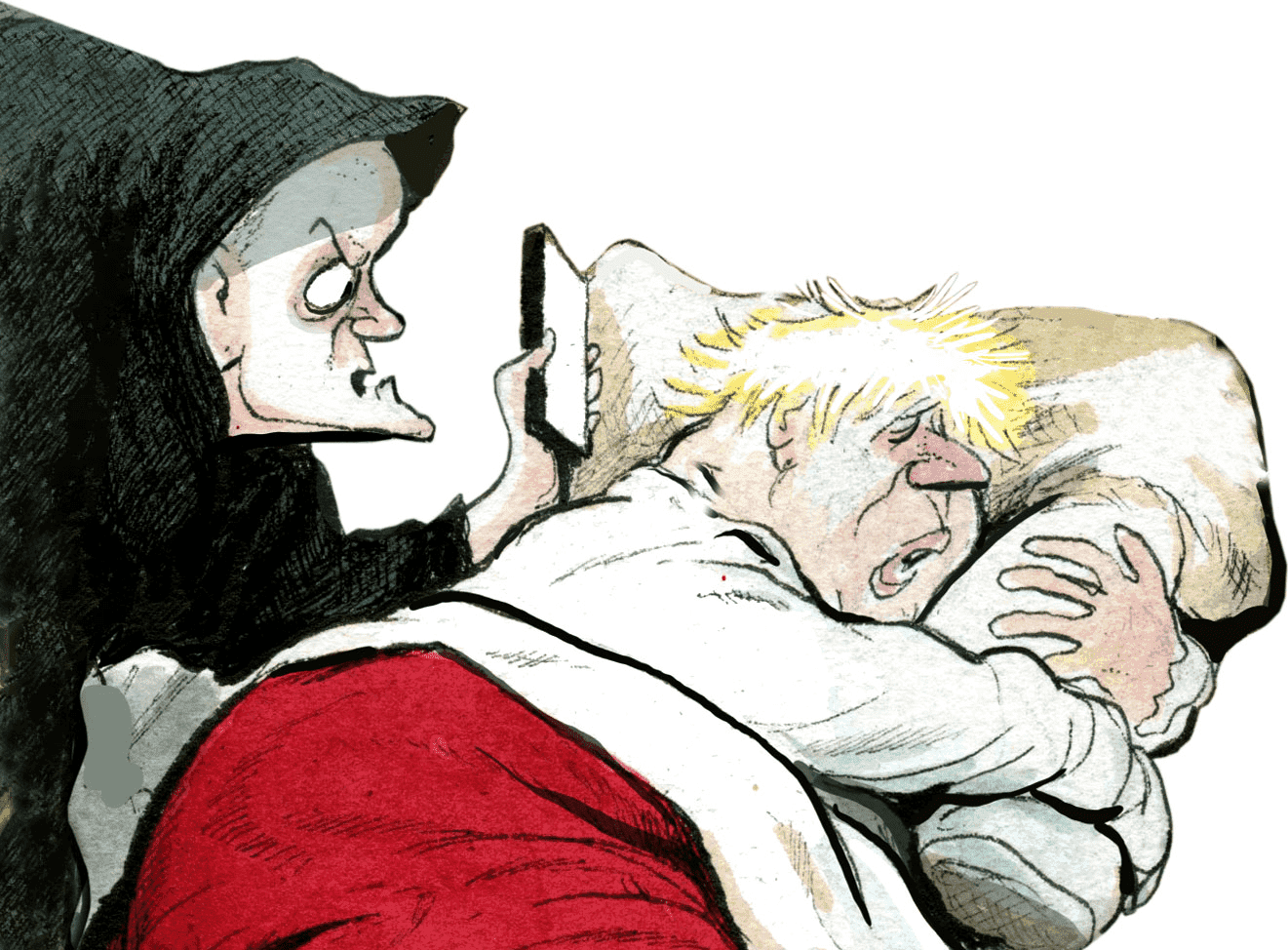I’m no Westminster insider, but there comes a point when you have to consider that perhaps Carrie Johnson was right about Dominic Cummings. That point for me arrived in May last year when, without giving any indication he might be the one at fault, Cummings unblinkingly described to a parliamentary committee his relationship with his former boss, Carrie’s husband the British Prime Minister:
‘The heart of the problem was, fundamentally, I regarded him as unfit for the job and I was trying to create a structure around him to try and stop what I thought were extremely bad decisions, and to push other things through against his wishes. And he had the view that he was Prime Minister and I should be doing what he wanted me to do. And that’s obviously not sustainable for very long.’
At the time, the arrogance and basic mendaciousness of this statement seemed astonishing. This was an unelected official quite openly admitting to deliberately stymying the work of the nation’s democratically elected leader. But I’ve since realised it’s part of a consistent pattern of what looks a lot like egomania.
In July last year, for example, Cummings told the BBC’s Laura Kuenssberg that ‘within days’ of Boris Johnson’s 80-seat election victory in December, 2019, he was discussing with his Vote Leave confreres how best to have the Prime Minister ousted and replaced, as if that was realistically something he had the power to do.
‘We only got him in there because we had to solve a certain problem, not because he was the right person to be running the country’, Cummings said.
This apparent belief in his own ability at will to subvert democracy, as if possessed of intelligence sufficiently, and singularly, brilliant to see through the human-made systems by which the rest of us are shackled, goes a long way, I think, to explaining much of his other public behaviour.
So far, no one within the government machine seems willing to fight back against Cummings.
A man possessed of this level of brilliance, for example, could hardly be expected to give verbal and written warnings to lowly Spads before firing them and having them marched by police from offices. Likewise, why would a man capable of playing jazz with the rules of complex state bureaucracy dress like all the other squares when presenting himself for work?
It helps to explain, too, the semi-frequent posting of multi-thousand word blogs so wildly bombastic and rambling as to be essentially unreadable. And also the daily acronym-laden, self-aggrandising tirades on Twitter, delivered always in the hectoring style of someone who has spent a lot of time in internet chat rooms.
The central message of most of Cummings’ online public writings, in fact, seems always to be the same: he, and he alone, knew how to deliver the British people from the ravages of the pandemic but that he was thwarted from doing so by the ‘clowns’ in Whitehall – most particularly by the former health secretary Hancock (Cummings will never lower himself to typing the hated word ‘Matt’).

Three years ago, handsome Hollywood A-list actor Benedict Cumberbatch portrayed Cummings – and not Nigel Farage – as the man most responsible for delivering Brexit. The nation, including the liberal intelligentsia who reviewed the film kindly, seemed happy to buy wholesale into the maverick genius mystique that was being sold. Perhaps for Remainers, attributing Brexit to Oxbridge-educated, north London-dwelling Cummings, rather than Farage, somehow made what had happened more palatable.
Brexit: The Uncivil War was beamed into the nation’s living rooms on a cold January evening when most people had nothing better to do than to watch. As a result, Cummings, a man almost no one outside SW1 previously knew much about, became suddenly very famous indeed.
Did the fame go to his head? People I respect and admire greatly say in private he’s a lovely man – a gentleman and a half, even – but can he really, pre-Cumberbatch, have believed it was his job to seize the levers of power from the leader of the world’s fifth largest economy? It’s hard to believe.
After an increasingly vicious, and strangely one-sided, campaign against his former boss that began shortly after he was fired, Cummings finally seems to have Boris exactly where he wants him: dangling desperately on the end of a string he is only too happy to tweak by supplying or orchestrating yet further revelations about supposed drinks parties at No. 10. That the media that not so long ago loathed him so vigorously is now so acquiescent, cannot be lost on him.
It means the blatant hypocrisy – his own trip to Barnard Castle, for example. Or the fact that Cummings himself can be seen slouched at a garden table drinking red wine in one of the most damaging photographs so far leaked, is, for now at least, largely forgotten. My enemy’s enemy, and all that.
Although certainly bad, my suspicion is the British public realises that on the scale of falsehoods foisted upon us over the years by Downing Street, a few illicit social gatherings in a pandemic does not really stack up against, say, lying about WMDs in order to start a war. I accept I may be very wrong about that, but no one will know for sure how the public really feels until the local elections in May – and only then if Boris is still in the hotseat.
Surprisingly, this appears to be a sentiment with which Cummings himself agrees. With his customary warmth, on his latest blog he wrote:
‘The real ‘culture problem’ in No 10 is not people having a drink, it’s that so few people in No.10/70 Whitehall work really hard and instead bitch about ‘work life balance’, a true sign of decadence and a leading indicator of why crisis management might collapse – a problem I tried hard to reverse.’
So far, no one within the government machine seems willing to fight back against Cummings. I think we can say this policy has not worked terribly well.
The question Tories considering defenestrating Boris must now consider is whether or not they like winning big majorities – something the Prime Minister’s track record, albeit most recently with Cummings’ support, suggests he can deliver consistently.
If they decide they do – and given the Prime Minister’s nemesis has made clear he won’t stop until Boris has been brought down – then surely it’s time to follow Carrie’s lead and fight back.








Comments